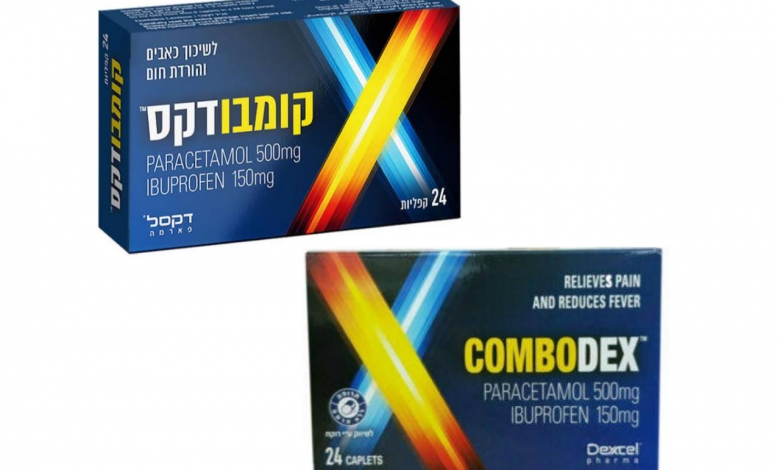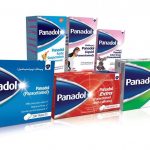Combodex: Uses, Dosage, Side Effects, Warnings

Combodex is a combination medicine that contains paracetamol and ibuprofen as active ingredients. Paracetamol, also known as acetaminophen, is a medication used to treat fever and mild to moderate pain. Ibuprofen is a medication in the nonsteroidal anti-inflammatory drug class that is used for treating pain, fever, and inflammation. This includes painful menstrual periods, migraines, and rheumatoid arthritis.
Each caplet of Combodex contains paracetamol 500 mg and ibuprofen 150 mg. Although paracetamol and ibuprofen work in different ways, in Combodex they work synergistically. Paracetamol is better than ibuprofen for some types of pain. Paracetamol is usually best for most types of pain, including headaches and stomach aches. Ibuprofen may be better for period pain or toothache.
Combodex is used for relief of pain such as headache, migraine headache, tension headache, sinus pain, toothache, backache, sore throat, period pain, muscular pain, rheumatic pain, pain associated with dental procedures, arthritis, tennis elbow, aches and pains associated with colds and flu. Reduces fever.
The combination of paracetamol and ibuprofen has been found to be efficacious in a variety of acute pain states, including postoperative pain, dysmenorrhoea, and musculoskeletal pain. A Cochrane review assessed the efficacy of single-dose paracetamol plus ibuprofen in a variety of dose combinations after wisdom tooth removal.
How should I take Combodex?
Swallow the Combodex pill with a full glass of water immediately after a meal. The score line on the caplet is only intended to facilitate breaking for ease of swallowing and not to divide into equal doses. Swallow the two parts together.
Do not crush or chew Combodex caplets to avoid the bitter taste of the medicine. The medicine is intended for use in adults and children over 12 years of age.
The usual dosage for adults and children over 12 years of age:
- 1-2 caplets every 6 hours, as required. Do not take more than 8 caplets in 24 hours.
Do not exceed the recommended dose.
Use the lowest effective dose for the shortest time necessary to achieve the treatment objective.
If your doctor prescribes a different dose, follow the doctor’s directions.
Consult a doctor if the symptoms worsen or do not improve or if you need to take the medicine for more than 3 days.
Warnings
Do not use Combodex if you are allergic to the active ingredient(s), other NSAIDs, or to any of the other ingredients of this medicine.
Do not use this medicine if you suffer or have previously suffered from bleeding from the rectum (back passage), black sticky bowel motions (stools), or bloody diarrhea.
Do not use this medicine if you suffer or have previously suffered from a peptic ulcer (i.e. stomach or duodenal ulcer).
Do not use Combodex if you are taking any other medicines containing paracetamol or ibuprofen.
Do not use Combodex if you regularly drink large quantities of alcohol.
Do not use this medicine if you suffer from severe heart failure, hepatic failure or renal failure.
Do not use this medicine if you suffer from cerebrovascular bleeding or other active bleeding.
Do not use Combodex if you suffer from blood-formation disturbances.
Do not use this medicine if you suffer from asthma, urticaria, or allergic reactions after taking aspirin/acetylsalicylic acid or other NSAIDs.
Do not use Combodex if you are in the last three months of pregnancy.
Anti-inflammatory painkillers like ibuprofen may be associated with a small increased risk of heart attack or stroke, particularly when used at high doses. Do not exceed the recommended dose or duration of treatment.
Do not consume alcoholic beverages while taking this medicine. Mixing alcohol with Combodex may cause liver damage.
If you are pregnant or are breastfeeding, think you may be pregnant, or are planning to become pregnant, consult your doctor or pharmacist before taking this medicine.
Take special care if you are in the first 6 months of pregnancy.
Before treatment with Combodex, tell a doctor or a pharmacist if:
• You suffer from heart problems including heart failure, angina (chest pain), or if you have had a heart attack, bypass surgery, peripheral artery disease (poor circulation in the legs or feet due to narrow or blocked arteries), or any kind of stroke (including ‘mini-stroke’ or transient ischaemic attack “TIA”).
• You suffer from high blood pressure, diabetes, high cholesterol, have a family history of heart disease or stroke, or if you are a smoker.
• You suffer from liver disease, hepatitis, kidney disease, or difficulty urinating.
• You are a drug user or a heavy drinker.
• You are pregnant or intend to become pregnant.
• You are breastfeeding or plan to breastfeed.
• You currently suffer from an infection.
• You plan to undergo surgery.
• You are over the age of 65.
• You suffer or have previously suffered from other medical conditions such as heartburn, indigestion, stomach ulcer or any other stomach problems, vomiting blood or bleeding from the back passage, severe skin reactions such as Stevens-Johnson syndrome, asthma, vision problems, the tendency to bleed or other blood system problems, bowel or intestinal problems such as ulcerative colitis or Crohn’s Disease, swelling of ankles or feet, diarrhea, inherited genetic or acquired disorder of certain enzymes that manifest with either neurological complications or skin problems or occasionally both i.e. porphyria’ smallpox’ autoimmune disease such as Lupus erythematosus.
The medicine contains ibuprofen which belongs to a group of medicines (NSAIDs) that may impair fertility in women. This effect is reversible upon stopping the treatment.
Taking this medicine may interfere with the results of the urine analysis test for 5-hydroxyindoleacetic acid (5HIAA), causing false-positive results. To avoid false results do not take Combodex or other paracetamol-containing products for several hours before or during the collection of the urine specimen.
If you are taking, have recently taken, or are planning to take any other medicines, including non-prescription drugs and nutrition supplements, please tell your doctor or pharmacist. Especially if you are taking:
• anti-coagulants (i.e. medicines for thinning the blood and preventing clotting e.g. aspirin/acetylsalicylic acid, warfarin, ticlopidine).
• medicines to treat epilepsy or fits such as phenytoin.
• chloramphenicol (an antibiotic used to treat ear and eye infections).
• probenecid, a medicine for the treatment of gout.
• zidovudine, a medicine for the treatment of HIV (the virus that causes AIDS).
• medicines for the treatment of tuberculosis such as isoniazid.
• aspirin/acetylsalicylic acid, salicylates, or other NSAID medicines.
• medicines for the reduction of high blood pressure (ACE-inhibitors such as captopril, beta-blockers such as atenolol, and angiotensin-ll receptor antagonists such as losartan).
• medicines for the treatment of other heart conditions such as digoxin.
• diuretics.
• lithium, a medicine used to treat certain types of depression.
• methotrexate, a medicine used to treat arthritis and certain types of cancer.
• corticosteroids, such as prednisone, and cortisone.
• metoclopramide, propantheline.
• tacrolimus or ciclosporin, immunosuppressive drugs used after organ transplant.
• sulphonylurea, a medicine for the treatment of diabetes.
• certain antibiotics (such as quinolone antibiotics).
These medicines may be affected by Combodex or may affect the way Combodex works.
You may need to take different dosages of your medicines, or you may need to take different medicines.
Please do not consider this information as an alternative to consulting your physician or pharmacist.
For further information on instructions for use, risks and side effects, please read the patient package insert and consult your doctor or pharmacist.
Read the patient package insert carefully before starting to take any medication.





